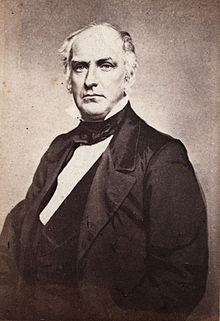Edward Dickinson Baker
| Edward Dickinson Baker Edward D. Baker Edward Baker |
|
|---|---|

|
|
|
United States Senator from Oregon |
|
|
In office October 2, 1860 – October 21, 1861 |
|
| Preceded by | Delazon Smith |
| Succeeded by | Benjamin Stark |
| Member of the U.S. House of Representatives from Illinois's 7th congressional district |
|
|
In office March 4, 1845 – January 15, 1847 |
|
| Preceded by | John J. Hardin |
| Succeeded by | John Henry |
| Member of the U.S. House of Representatives from Illinois's 6th congressional district |
|
|
In office March 4, 1849 – March 3, 1851 |
|
| Preceded by | Thomas J. Turner |
| Succeeded by | Thompson Campbell |
| Member of the Illinois Senate | |
|
In office 1840-1844 |
|
| Member of the Illinois House of Representatives | |
|
In office 1837-1840 |
|
| Personal details | |
| Born |
February 24, 1811 London, England |
| Died | October 21, 1861 (aged 50) Loudoun County, Virginia |
| Cause of death | Killed in Battle of Ball's Bluff |
| Political party | Whig, Republican |
| Spouse(s) | Mary Ann Lee Baker |
| Children | 5 |
| Parents | Edward Baker Lucy Dickinson Baker |
| Profession | Politician, Lawyer, Teacher |
| Religion | Churches of Christ |
| Military service | |
| Allegiance | United States of America |
| Service/branch |
United States Army Union Army |
| Years of service | 1846 - 1847, 1861 |
| Rank |
|
| Commands |
4th Illinois Infantry 3rd Brigade, 3rd Division 3rd Volunteer Division (temporary) 1st California Infantry Regiment California Brigade |
| Battles/wars | |
Edward Dickinson Baker (February 24, 1811 – October 21, 1861) was an English-born American politician, lawyer, and military leader. In his political career, Baker served in the U.S. House of Representatives from Illinois and later as a U.S. Senator from Oregon. A long-time close friend of the President of the United States, Abraham Lincoln, Baker served as U.S. Army colonel during both the Mexican-American War and the American Civil War. Baker was killed in the Battle of Ball's Bluff while leading a Union Army regiment, becoming the only sitting senator to be killed in the Civil War.
Born in London in 1811 to schoolteacher Edward Baker and Lucy Dickinson Baker, poor but educated Quakers, the boy Edward Baker and his family left England and immigrated to the United States in 1816, arriving in Philadelphia, where Baker's father established a school. Ed attended his father's school before quitting to apprentice as a loom operator in a weaving factory. In 1825, the family left Philadelphia and traveled to New Harmony, Indiana, a utopian community on the Ohio River led by Robert Owen and sought to follow communitarian ideals.
...
Wikipedia
